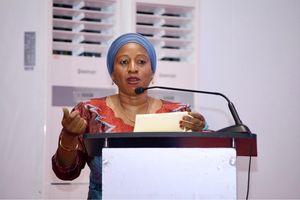Why African teams fell short at the World Cup

What you need to know:
- There were high hopes as the quadrennial tournament started that Africa could build on its display in Brazil in 2014 when two teams – Nigeria and Algeria – reached the second round for the first time.
At every World Cup tournament since 1986, at least one team from Africa has made it to the second round of the World Cup finals. That record unceremoniously ended in Russia 2018, after all five countries – Egypt, Tunisia, Morocco, Nigeria and Senegal - were knocked out in the preliminary round.
There were high hopes as the quadrennial tournament started that Africa could build on its display in Brazil in 2014 when two teams – Nigeria and Algeria – reached the second round for the first time.
Instead, the African continent, and its soccer adoring fans are wondering how teams boasting of European based players, who play at the highest level could suffer 10 defeats, two draws and a mere three wins out of 15 games played in Russia?
Indeed one writer wondered whether the early elimination could be bad luck, or a lack of flair. But the circumstances characterising the exit of each of the African teams were in many respects quite unique.
Egypt
Egypt bounced back into the World Cup after a 28-year absence. A lot was expected from them given that they’ve won the African Cup of Nations a record seven times. The World Cup was ideal to demonstrate their prowess, first because they were in a manageable group and secondly, in Mohammed Salah, they had one of the world’s best players. Salah’s injury on the eve of the tournament proved too costly to overcome and the rest of the players failed to raise their game to fill the void in the loss to Uruguay in the opening game.
Morocco
Morocco’s campaign started with a painful own goal in stoppage time of their opening game to gift Iran a 1-0 win. It was a huge and costly defensive error against a beatable opponent. Indeed, Morocco competed impressively in all their matches. Against the European champions Portugal, the team impressed with their offensive approach, passing, and fluidity as they sought to equalise. But conceding goals either very early or late can cost a team heavily and Morocco were twice on the losing end. Their performance, like other African teams, raises questions about game tactics when leading or trailing or early and late phases of the game.
Nigeria
Nigeria showed promise given that they were the youngest team in the tournament featuring 18 players who had never played at a World Cup before. Unfortunately, this young squad learnt the hard way as they were just four minutes away from qualifying for the knockout rounds when Argentina scored a goal that knocked them out.
Nigeria paid the price for starting slowly in the tournament, especially in the first match against Croatia.
Tunisia
Like Egypt, Morocco and Nigeria, the Carthage Eagles lost their opening game to England in stoppage time. Next, Tunisia were mercilessly hammered by a hungry Belgium 5-2.
Senegal
Senegal started on a high note when they beat Poland 2-1, raising hopes that they would shine.
But the dropped points against Japan in a 2-2 draw exposed their game management deficiencies while leading in a close game. The fact that they picked up unnecessary yellow cards in their first two games rendered them vulnerable against Colombia. Indeed, their tied points with Japan led to Japan progress because Japan had a better disciplinary record – four yellow cards while Senegal had six.
Poor disciplinary records are a characteristic that African teams have struggled with even in past competitions.
Hopes for next time
A great deal of hope was being placed on a few outstanding talents that were either injured or whose abilities did not blossom due to tactical limitations and tight marking by opposing teams.
Source: Conversation Africa




